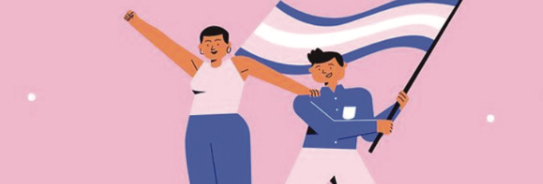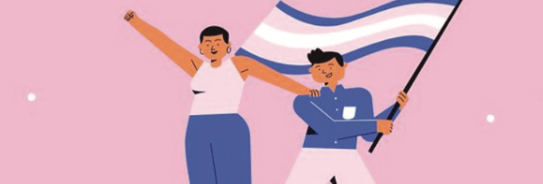International Transgender Day of Visibility is an annual event, occurring every year on March 31, and it is dedicated to raising awareness of discrimination faced by transgender people worldwide, as well as a celebration of transgender people and their contributions to society.
SSU commemorated this day by hosting a Transgender Week of Visibility, complete with events hosted by the HUB. These events were moderated and facilitated by a team of individuals who all have varying experiences in the trans* and/or gender diverse community.
The various events hosted throughout the week ranged from fun activities, like a game night hosted by a local LGBT+ non-profit organization, to informative ones, like the trans-inclusive sex education workshop hosted by Planned Parenthood. There were also panels, which allowed space for trans* individuals to talk about their experiences with transphobia, among other different types of discussions..
The Transphobia Workshop hosted by the HUB was a space for allies to learn about the harmful impacts of transphobia, and to hear from individuals who have experienced it personally. The workshop encouraged participants to think about what harmful things they have been taught to believe about transgender people.
Melle Browning, the first moderator of this event, is a queer, gender non-conforming trans man and counselor at SSU’s Counseling and Psychological Services. Browning is a Licensed Marriage and Family Therapist, earning his Master’s in Counseling Psychology from Dominican University of California. He also earned a BA in Psychology with a minor in Women and Gender Studies from Sonoma State University. Browning works from an intersectional, trauma informed, anti-oppression lens and a focus on equity in care.
Another facilitator, Orlando Kai O’Shea, is a transmasculine student at SSU studying psychology. He is a long time volunteer at Trans Lifeline crisis hotline and a founding committee member for TransLife, which holds a yearly conference in Sonoma County for the transgender community. He is on the board of directors of Positive Images LGBTQ Center, and co-facilitates the SSU transgender support group.
The last facilitator of the event, Ariel Erskine, is a pansexual woman with a trans experience and is a filmmaker and illustrator, and drummer for folk-punk band, Gender Trash. Erskine is a mother of five children, and currently lives in Northern California with her girlfriend and their blended family. She seeks to bring attention to the rights of the LGBTQ+ community and other social and civil liberties issues through her art and community activism.
The workshop began by discussing the myth that transgender individuals can just “try harder” to live within the sex they were born into, rather than cisgender people actively working to validate and accept transgender people. This myth leads to transphobia, and violence against transgender people.
According to the Human Rights Campaign, “2020 has already seen at least 44 transgender or gender non-conforming people fatally shot or killed by other violent means, the majority of which were Black and Latinx transgender women. We say “at least” because too often these stories go unreported or misreported.”
Checking in is critical, because many times, even the best intentions can lead to unsafe situations for trans* individuals; Erskine talked about their own experiences with someone who introduced her to everyone as their trans friend, which essentially minimized the other parts of Erskine’s life, while placing their trans* identity front-and-center. O’Shea bounced off of Erskine’s comment, and said, “be really careful about not outing people.”
O’Shea talked about the dangers that outing someone can create, saying that with every time he is outed to someone, is “another opportunity to put me in danger,” and said, “there are a lot of risks to being openly trans and that’s a good thing to understand.”
Browning discussed privilege, and how having trans-masculine privilege (though not necessarily, male privilege), among other types of privilege, can affect how someone navigates the world as a trans or gender non-conforming person.
There are resources on campus for transgender, queer, and questioning students through SSU’s campus. The HUB hosts workshops, groups, and events which encourage conversation about gender and sexuality in an open environment; the Queer Students Alliance is also a safe space for transgender, gender diverse, queer, and questioning students. Students in need of support, or facing transphobia, can reach out to Counseling and Psychological Services (CAPS) to get the support they need.
For Transgender Week of Visibility, Sonoma State celebrated transgender people and their contributions to society, as well as raised awareness of worldwide discrimination.





![[Both photos courtesy of sonoma.edu]
Ming-Ting Mike Lee stepped in as the new SSU president following Sakakis resignation in July 2022](https://sonomastatestar.com/wp-content/uploads/2024/04/CC4520AB-22A7-41B2-9F6F-2A2D5F76A28C-1200x1200.jpeg)



























